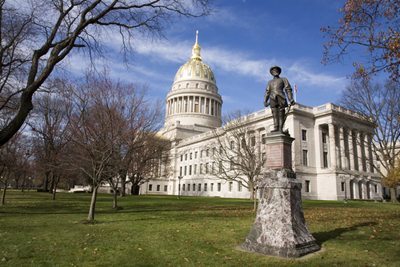20-Week Abortion Ban Advances in West Virginia Senate
The controversial measure was softened somewhat with an amendment, but advocates decry its chilling effect on medicine and its unconstitutionality.

As pro-choice protesters gathered outside the West Virginia Senate chamber on Tuesday, the Senate Health and Human Resources Committee amended and voted to advance a controversial bill to ban abortion after 20 weeks’ gestation in the state.
The committee’s amendment softened the bill somewhat by reducing the penalty against doctors from a felony with possible jail time to a misdemeanor and allowing for an abortion or induction if a fetus is not medically viable. But a provision requiring doctors to file detailed reports on every abortion remains intact.
Responding to the news, a Nebraska resident wrote an emotional plea to West Virginia legislators in the Charleston Gazette not to pass the new bill, which resembles a 20-week ban in her state that does not have an exception for nonviable fetuses or lesser penalties for doctors. Deaver said she suffered with an infection for ten days after her water broke prematurely at 22 weeks because her doctor said he could go to jail if he induced labor on her.
“We have been told women’s and doctor’s concerns are being heard. But the fact is, it is impossible to make palatable a bill that is this heinous,” Margaret Chapman Pomponio, executive director of the reproductive justice organization WV Free, told Rewire. “While penalties were lessened, this legislation takes away medical decision making and criminalizes doctors.”
“Frankly, I don’t want to be on call wondering if I’m going to be prosecuted for terminating a pregnancy,” said Dr. David Jude, an OB-GYN at the Marshall University School of Medicine, during the committee meeting.
An amendment to move the ban to 24 weeks by Senate Judiciary Chairman Corey Palumbo (D-Kanawha) failed resoundingly. “It’s frustrating we’re apparently willing to pass a bill that, based on all the evidence out there, would be rejected by the courts as unconstitutional,” Palumbo said.
Twenty-week bans are unconstitutional under Roe v. Wade in that they ban abortion before a fetus can survive outside the womb, which could mean a long and expensive legal battle for the state if the bill were to pass. Three states have passed 20-week bans and seen them blocked by courts for being unconstitutional, while nine have them still in effect.
A poll commissioned by Planned Parenthood Health Systems over the weekend showed that 62 percent of registered West Virginia voters in three key districts support access to abortion at 20 weeks once they are reminded that such abortions are very rare (about 1 percent of all procedures) and that fetal abnormalities are often involved.
The bill now moves to the state senate’s judiciary committee.
“Hundreds of calls and thousands of emails are pouring into Senate offices, yet the bill keeps traction,” said Chapman Pomponio. “I don’t know how we are to maintain confidence in the democratic system when the voice of the majority is ignored.”
Correction: A version of this article incorrectly noted that a provision of the 20-week ban that would allow family members of a woman who has had an abortion to seek an injunction against a doctor performing a later abortion was still in the bill; it is not. We regret the error.
